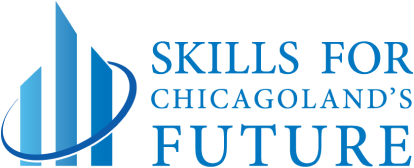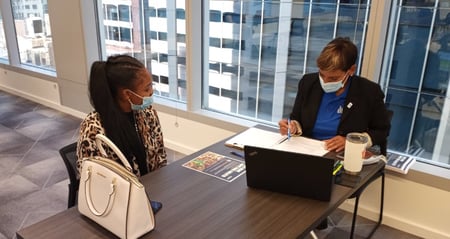You’ve fully prepared for your job interview by researching the company, practicing common interview questions, thinking of your best professional experiences to share, and gathering what you need to bring with you. Now, it’s interview day, your time shine by putting everything you’ve prepped into practice. In this post, I share with you what to do—and what not to do—the day of your interview to be successful.
DO…
- Do your research. Look up the company's goals, achievements, and values, and review the job description so you can speak to why you're a great fit.
- Remember to eat. You may feel too nervous to have a full meal, but try to at least have a healthy snack. If you go in on an empty stomach, you’ll become tired and won’t be able to think clearly during your interview.
- Dress the part. Take a shower, brush your teeth, pick out a clean, neat outfit. Check out our post for tips and advice on what to wear for your interview! Remember, first impressions make all the difference.
- Plan to arrive at least 15 minutes early. You should have already mapped your route and have an idea of how long it will take to get to your interview site. Give yourself extra time to be on time—in this case, early. Add at least 30 minutes to your travel time just in case you miss a transfer or the weather is bad. This also gives you extra time to get through building security, find the company’s office, and wait to be helped at reception. A late arrival could not only cost you the job but also prevent you from other jobs at that company in the future. If you’re running late, always communicate that as soon as possible to your Skills recruiter or your contact at the company using every method available: phone, text and email.
- Greet everyone with respect and enthusiasm. Meredith, one of my colleagues at Skills, tells her candidates:, “Everyone you interact with has a say in whether or not you will get hired. From the moment you call the office to let the company know that you have arrived, your interview has begun, and you need to be ‘on’ from that moment forward. By being professional right from the get go, candidates set the tone that they are professional and prepared.” This is great advice no matter what type of job you’re interviewing for!
- Wait patiently and remember to breathe. While sitting in the reception area, take deep breaths to help calm your nerves. Look over a copy of your resume to get your brain going. If you must check your phone, make sure you’re ready to immediately slide it in a pocket or bag when someone comes to get you.
- Greet the interviewer with a smile and a firm handshake. Remember, you’re excited to be there, so show them you’re enthusiastic and confident from the initial interaction.
- Sit upright and maintain good posture. This, too, signals that you are confident and certain of your abilities, which is exactly what the company is looking for in a candidate.
- Make eye contact, smile, and nod your head. This shows you’re interested in the conversation and not distracted by something else. Use this positive body language to show the interviewer how interested you are in the role.
- Provide specific examples for behavioral based questions. You’ve already thought examples and formed answers while preparing for the interview. When asked a question, take a minute to just gather your thoughts and then naturally state your answer using sincere language.
- Ask insightful questions to the interviewer. You’ve prepared, and this is your final chance to convince the hiring manager you are the right person for the job. Your questions help the interviewer understand your motivations – always ask questions about how YOU can help the company, not about what the company can do for you!
- Follow up to say, “Thanks!”
DON’T…
- Be uninformed of the role or the company. You should have learned as much as possible from your Skills interview and your own research. If there is anything that you’re uncertain of, ask your Skills recruiter for more information.
- Share personal information. The interviewer doesn’t want or need to know your age, family history, life story, etc., so don’t feel the need to offer up any of those details. If asked for any of this information during an interview, your best options are to either use general language to answer the question without providing specific details, or gracefully change the subject. If you are asked an overly personal question that you think may be illegal, please inform your Skills recruiter ASAP following the interview.
- Appear disinterested. Remember to maintain eye contact to show you are engaged with the conversation, interested in speaking with the interviewer, and excited to learn more about the company and the role.
- Rely only on your resume. Because you’ve prepared and practiced, you should be able to sell yourself in detailed, specific answers. Make sure to expand on what is already on paper.
- Give vague or general answers for behavioral based questions. The interviewer wants to know specifically how you would approach a similar situation with them.
- Chew gum during the interview. If you’re chewing gum to freshen your breath, remember to throw it away before you enter the building. If your mouth gets dry when you are nervous, always feel free to bring a bottle of water or coffee.
- Answer your cell phone or respond to a text. Your phone should be turned completely off, not just set to vibrate, before you even enter the building.
- Use casual language or slang. Everyone says “um,” “uh,” “like,” etc. when nervous, but do your best to limit the use of these words and avoid using words or phrases that are overly familiar, even if your interviewer is friendly. And try to speak clearly and slowly.
- Speak negatively about former coworkers, employers, or customers. This is a big red flag that you might have a bad attitude or aren’t able to take responsibility for your actions.
- Speak negatively about yourself. You want to always stress your achievements and qualifications. Even if asked, “Tell me about a time you failed,” include what you learned from that negative experience.
- Be cocky or arrogant. Confident people want to learn more and become better, while arrogant people are unwilling to learn or change their ways.
- Stretch the truth or lie. You must always present yourself as honest and trustworthy. The hiring manager has enough knowledge and experience to be able to tell when you’re not telling the truth.
By following these simple dos and don’ts, you’ll be sure to ace your next job interview.



